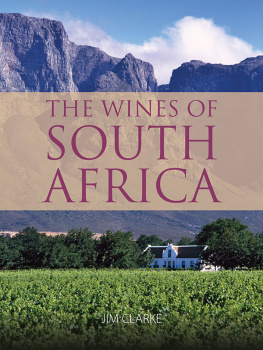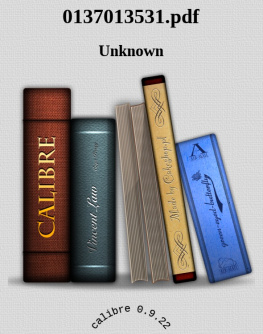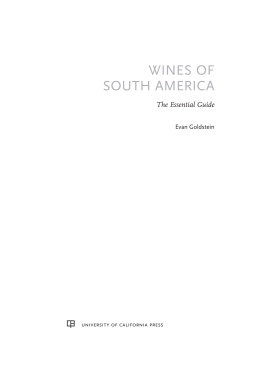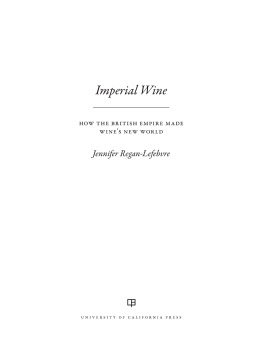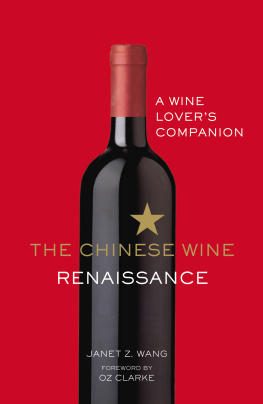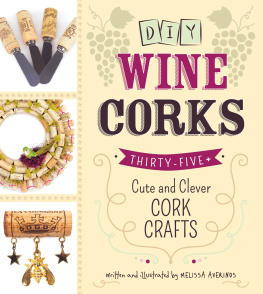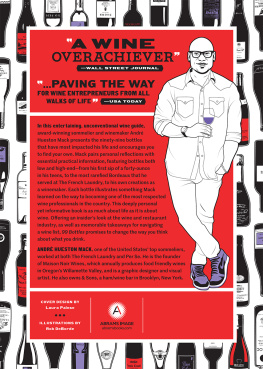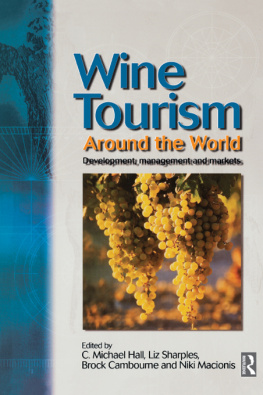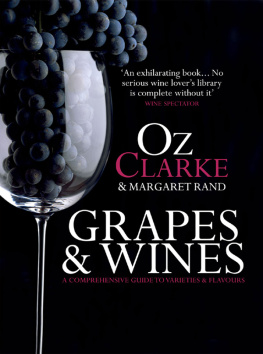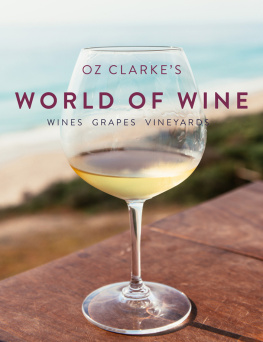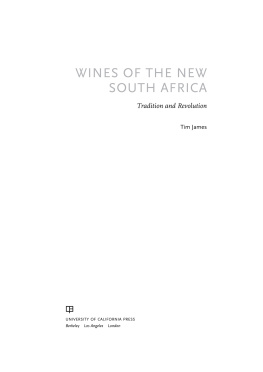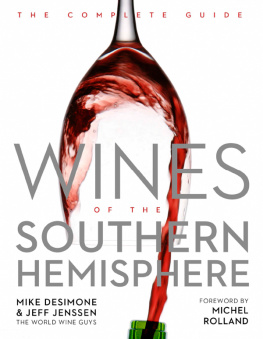THE CLASSIC WINE LIBRARY
Editorial board: Sarah Jane Evans MW, Richard Mayson and James Tidwell MS
There is something uniquely satisfying about a good wine book, preferably read with a glass of the said wine in hand. The Classic Wine Library is a series of wine books written by authors who are both knowledgeable and passionate about their subject. Each title in The Classic Wine Library covers a wine region, country or type and together the books are designed to form a comprehensive guide to the world of wine as well as an enjoyable read, appealing to wine professionals, wine lovers, tourists, armchair travellers and wine trade students alike.
Port and the Douro , Richard Mayson
Cognac: The story of the worlds greatest brandy , Nicholas Faith
Sherry , Julian Jeffs
Madeira: The islands and their wines , Richard Mayson
The wines of Austria , Stephen Brook
Biodynamic wine , Monty Waldin
The story of champagne , Nicholas Faith
The wines of Faugres , Rosemary George MW
Cte dOr: The wines and winemakers of the heart of Burgundy , Raymond Blake
The wines of Canada , Rod Phillips
Ros: Understanding the pink wine revolution , Elizabeth Gabay MW
Amarone and the fine wines of Verona , Michael Garner
The wines of Greece , Konstantinos Lazarakis MW
Wines of the Languedoc , Rosemary George MW
The wines of northern Spain , Sarah Jane Evans MW
The wines of New Zealand , Rebecca Gibb MW
The wines of Bulgaria, Romania and Moldova , Caroline Gilby MW
Sake and the wines of Japan , Anthony Rose
The wines of Great Britain , Stephen Skelton MW
The wines of Chablis and the Grand Auxerrois , Rosemary George MW
The wines of Germany , Anne Krebiehl MW
The wines of Georgia , Lisa Granik MW
The wines of South Africa , Jim Clarke

Jim Clarke studied music composition at Western Washington University, the Royal Academy of Music in London, and the Koninklijk Conservatorium in Den Haag. He became interested in wine after moving to New York City in 2001. Like many would-be artists, he took a job waiting tables. The restaurant group where he worked had a superb wine education program, led by Greg Harrington, MS, and Tim Wilson, and in 2003 Jim also began taking wine classes outside work with the American Sommelier Association.
That same year a writing competition led to an introduction to South African wine as well as a position at StarChefs.com. In 2004 he published an op-ed in the New York Times and began freelancing more broadly, eventually writing for a wide range of publications, including the San Francisco Chronicle , World of Fine Wine , Beverage Media , and Fortune , among others. In 2006 he took a sommelier position at Megu, a Japanese restaurant in lower Manhattan. A year later he took over the program there, and in 2011 he moved on to run the beverage program at New Yorks Armani Ristorante.
In 2013 Jim left the restaurant trade to take a position as Wines of South Africas U.S. marketing manager. In that role he has promoted South African wine exports and become an educational ambassador for the category. Jim remains active as a freelance writer, covering wine, sake, and related subjects. He speaks regularly at a number of wine events and judges in several international wine competitions.
Outside of wine Jim is an active opera-goer, amateur blacksmith, and enthusiastic Dungeons & Dragons player. He lives with his wife and fellow wine-writer Shana Clarke on the Lower East Side of Manhattan.
Copyright Jim Clarke, 2020
The right of Jim Clarke to be identified as the author of this book has been asserted in accordance with the Copyright, Designs and Patents Act 1988.
First published in 2020 by
Infinite Ideas Limited
www.infideas.com
All rights reserved. Except for the quotation of small passages for the purposes of criticism or review, no part of this publication may be reproduced, stored in a retrieval system or transmitted in any form or by any means, electronic, mechanical, photocopying, recording, scanning or otherwise, except under the terms of the Copyright, Designs and Patents Act 1988 or under the terms of a licence issued by the Copyright Licensing Agency Ltd, 90 Tottenham Court Road, London W1T 4LP, UK, without the permission in writing of the publisher. Requests to the publisher should be emailed to the Permissions Department, .
A CIP catalogue record for this book is available from the British Library
ISBN 9781910902981
Brand and product names are trademarks or registered trademarks of their respective owners.
Cover: Boschendal manor house and vineyard, Franschhoek, South Africa (Paarl) Cephas/Peter Titmuss
Picture credits: DGB .
ACKNOWLEDGMENTS
My introduction to South African wine came about indirectly. In 2003 Wines of Spain, together with the American Sommelier Association, sponsored a writing competition. I was a waiter and composer at the time, but had begun taking the ASAs courses and was eyeing sommelierhood as a potential career path. I took what I knew about writing music, applied it to my essay, and won a weeklong trip to Rias Baixas. On that, my first professional wine trip, I became friends with Rory Callahan, who had helped organize the competition. He consulted for a number of wine marketing organizations, including Wines of Spain, New Zealand Winegrowers, and Wines of South Africa.
Rory introduced me to South African wine, and arranged my first trip to the country in 2006. He cultivated my interest in and passion for South African wine in many ways; without his influence I would never be in the position to write this book.
I have visited South Africa repeatedly since then. The winery owners, winemakers, viticulturalists, and workers of South Africas winelands have always been incredibly welcoming and generous with their time, whether I came as a journalist, a chaperone of WOSA visitors, or simply socially. In researching this book I have looked back to my earliest experiences there as well as spoken to a great many old and new friends. Any thank you to members of the industry will leave someone out, but I would like to mention at least the following: Hans Astrom, Kevin Arnold, Charles Back, Adi Badenhorst, Simon and Murray Barlow, Gary Baumgarten, Sebastian Beaumont, Abrie Beeslaar, Ntsiki Biyela, Petrus Bosman, Jeanette Bruwer, Paul Cluver Jr. and Sr., Jan Coetzee, Danie De Wet, Peter De Wet, Neil Ellis, Pieter Ferreira, Peter Finlayson, Ken Forrester, Boela Gerber, Paul Gerber, Niel Groenewald, Bruce Jack, Marc Kent, Richard Kershaw, Christo and Etienne LeRiche, Attie Louw, Adam Mason, Chris and Andrea Mullineux, David Nieuwoudt, Bruwer Raats, Mike Ratcliffe, Johan Reyneke, Anthony Hamilton Russell, Eben Sadie, Duncan Savage, David Sonnenberg, Danie Steytler, Hannes Storm, Denise Stubbs, David Trafford, Beyers Truter, Carl van der Merwe, Niels Verburg, Conrad Vlok, Thomas Webb, and Chris Williams. Beyond those above directly involved with production at individual wineries, I would also like to thank Rico Basson, Michael Fridjhon, Rosa Kruger, and Linda Lipparoni for their insights and passion. Thats just a sliver of the industry members who, over the years, have provided me with information and context for the creation of this book.
My colleagues present and past at Wines of South Africa have of course been a great source of support and insight as well. Siobhan Thompson, WOSAs current CEO, as well as her predecessor Su Birch, and Andre Morgenthal, now of the Old Vines Project, have been fantastic resources of information and enthusiasm. So too have been the rest of the WOSA team. In particular I would like to thank Laurel Keenan and the other international members of the team for helping broaden my perspective beyond that of an American sommelier.
Next page
